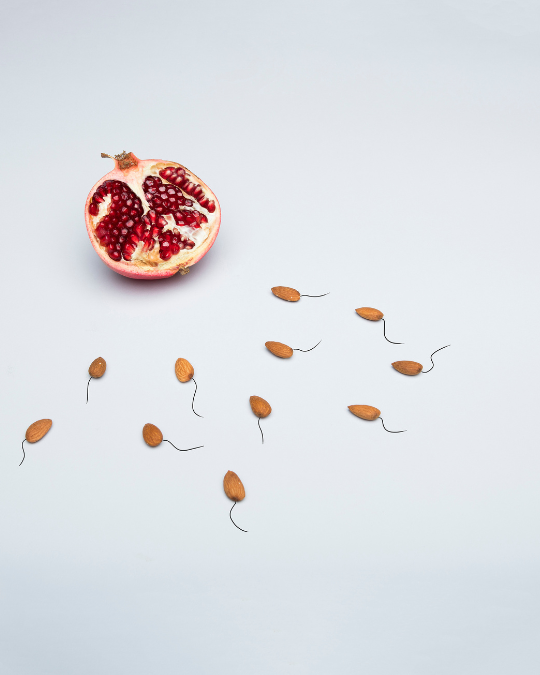As a fertility dietitian, I am asked this question all the time. I would love to say that there is a specific diet but at the moment, there is not enough evidence to say that there is an official ‘fertility diet’. But the good news is that the research suggests there are certain dietary patterns or specific dietary strategies that can optimise fertility!
These dietary patterns can be found in a Mediterranean-style diet which has lots of fruit and vegetables, legumes, whole grains, oily fish and olive oil, some poultry, fish dairy, and a low amount of red meat. The foods are unprocessed and low in saturated fat and added sugar. If you are starting to think about nutrition and fertility, this is the best place to start as these dietary strategies are associated with a reduced risk of infertility if you have problems with ovulation positive outcomes in IVF2,3 and for the men …. an improvement in sperm parameters4!
Let’s look at 5 tips that you can follow to optimise your fertility

Include sources of Omega 3
They are essential fatty acids which means we need to have them in our diet as our bodies can’t make them. They have a significant anti-inflammatory effect which protects our eggs and sperm as they mature. Including a portion of oily fish once a week is a good place to start. If you don’t like fish there are non-fish sources such as walnuts almonds, flaxseeds, chia seeds, edamame, rapeseed or canola oil, walnut or soya oil, omega-3 enriched foods e.g. yogurts/spreads/milk/orange juice/eggs. Unfortunately, the plant sources of omega-3 aren’t the same as the sources of omega-3 from oily fish so it might be worth checking with a fertility dietitian to see if you need an omega-3 supplement.
My Top Tip
I love the acronym S.M.A.S.H to help remember examples of oily fish. ‘Salmon, Mackerel, Anchovies, Sardines Herring’.

Increase fruit and vegetables
You have probably heard this one before but do you know why it’s so important? Fruit and vegetables are packed full of antioxidants which are molecules that protect cells from damage. As the female egg and male sperm are cells, antioxidants are really important in promoting egg & sperm quality by protecting them from cell damage.
My Top Tip
The best tip I can give you is to eat a rainbow! The more colours you choose the bigger array of nutrients you will be able to consume to nourish your eggs and your sperm. Try to aim for 2 fruits & 5 vegetables each day. Sounds like a lot? No problem – just break it down. If you are having 2 vegetables per day, then just aim for 3 and work your way up over a few weeks until you get to 5 per day! You can do this by including:- Extra vegetables with dinner
- Adding fruit to breakfast
- Snacking on fruit or vegetable crudites and dip e.g. humous

Include high fibre carbohydrates
Poor carbohydrates, they get such bad press! When I discuss these with my clients, I emphasise choosing carbohydrates that are high in fibre. The fibre helps control our blood sugar which is really important for people that are trying to lose weight or have insulin resistance, Polycystic Ovary Syndrome and Endometriosis.
Whole grains are great examples of high fibre carbohydrates and include wholemeal or wholegrain bread or crispbreads, dark 'seedy' bread, wholemeal or wholegrain wheat, oat, rye, basmati or wholegrain rice, wholegrain breakfast cereals, wheatgerm, bulgur, quinoa.
My Top Tip
A great tip is to make sure that you are having the correct portion size. You can do this by checking the back of pasta and rice packets for the portion sizes. Another tip I advise my clients is to fill half of their plate with vegetables & salad, a quarter with carbohydrates and the second quarter with a protein source, for example, chicken, fish or lentils. This will not only ensure you are getting the correct portion size of carbohydrates but also make sure that you are getting a good mix of different nutrients to support your fertility.

Reduce Foods that are high in saturated, trans fat and added sugar
Try to minimise foods that contain high levels of sugar, trans and saturated fat such as foods that are fried, biscuits, pastries, cakes and processed meats like pudding and sausages. By minimising these foods in your diet, you are protecting your egg and sperm from damage while they are developing.
My Top Tip
Make small changes by reducing portion sizes for example instead of having 2 fried sausages as part of your cooked breakfast, switch to 1 baked sausage with your cooked breakfast.3 Month-time Frame
It takes approximately 3 months for both the egg and sperm to mature and develop so this gives a timeframe to work on maximising your egg and sperm quality. Starting these changes at least 3 months prior to conception or 3 months before your egg collection can help promote egg and sperm quality.
The information provided in this blog or on social media is for general informational purposes only and should not be used as an alternative to a tailored dietetic assessment. If you would like an individualised consultation, please check out my details on how to contact me.
For more see nourishmyfertility.ie
- Chavarro JE, Rich‐Edwards JW, Rosner BA, Willett WC. Diet and lifestyle in the prevention of ovulatory disorder infertility. Obstet Gynecol. 2007;110:1050–58.
- Sun H, Lin Y, Lin D, Zou C, Zou X, Fu L, Meng F, Qian W. Mediterranean diet improves embryo yield in IVF: a prospective cohort study. Reprod Biol Endocrinol. 2019 Sep 2;17(1):73. doi: 10.1186/s12958-019-0520-9. PMID: 31477128; PMCID: PMC6720942.
- Karayiannis D, Kontogianni MD, Mendorou C, Mastrominas M, Yiannakouris N. Adherence to the Mediterranean diet and IVF success rate among non-obese women attempting fertility. Hum Reprod. 2018 Mar 1;33(3):494-502. doi: 10.1093/humrep/dey003. PMID: 29390148.
- Cao LL, Chang JJ, Wang SJ, Li YH, Yuan MY, Wang GF, Su PY. The effect of healthy dietary patterns on male semen quality: a systematic review and meta-analysis. Asian J Androl. 2022 Sep-Oct;24(5):549-557. doi: 10.4103/aja202252. PMID: 35915543; PMCID: PMC9491032.





